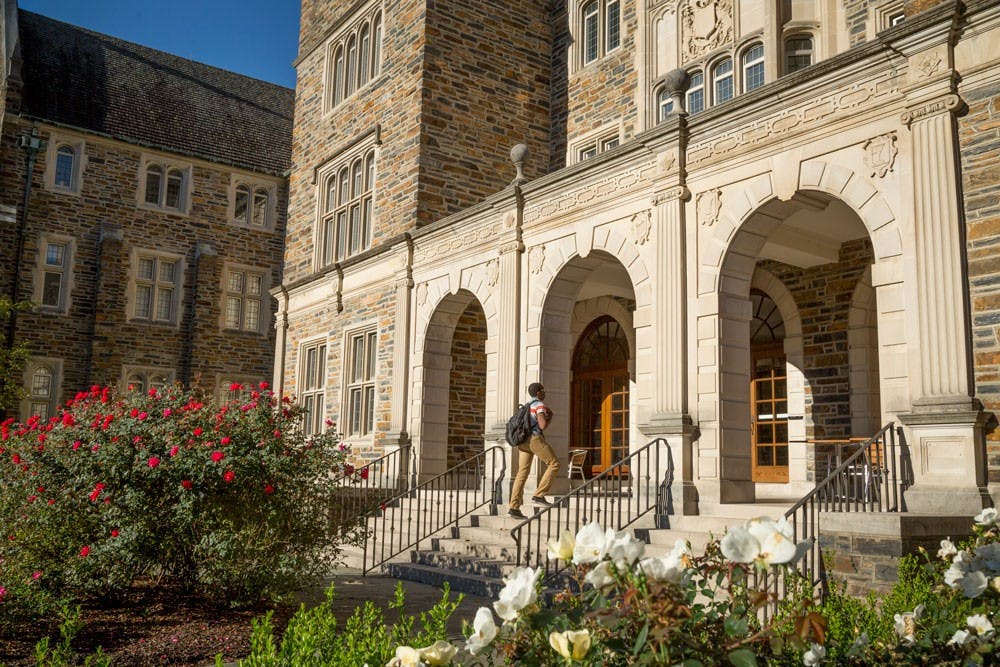Duke students who want to go beyond just getting a major can choose from dozens of minors or second majors, or even create their own courses of study. But there's one opportunity that can go overlooked among all the options: the University's certificate programs.
In supplementing their majors with certificates, students gain interdisciplinary exposure and marketable skills for the workforce, while also reaping the benefits of a traditional dive into an academic field.
“The advantage of the certificate program generally is that it adds breadth on top of a major, which is depth,” said Michael Munger, who directs the philosophy, politics, and economics certificate program. Munger is also a professor of political science and director of undergraduate studies of the department of political science.
A certificate differs from a typical major or minor because it allows students to explore aspects of a specialized field—like journalism or Islamic studies—by enrolling in courses spanning a range of disciplines, Kathryn Kennedy, executive director of communications for the Trinity College of Arts and Sciences, wrote in an email.
Complementing this interdisciplinary quality, certificates also require students to take a capstone course that involves research or a hands-on project; some certificates further include an internship or other experiential component.
Trinity currently offers 23 certificate programs. The Pratt School of Engineering offers four certificates, two of which overlap with Trinity’s. The offerings encompass a multitude of topics, from aerospace engineering to Jewish studies to sustainability engagement.
The life cycle of a certificate
Duke first established certificate programs in 1983 to “encourage and incorporate interdisciplinarity,” Kennedy wrote. A certificate in neuroscience, established in 1985, and a certificate in markets and management studies, created in 1989, were some of the earliest. By 1997, a student at Duke could choose from 15 certificate programs.
The University created undergraduate certificates in order to provide students with the opportunity to engage in “emerging fields not yet represented in Duke’s curricular offerings,” José María Rodríguez García, chair of the Arts and Sciences Council and associate professor of romance studies, wrote in an email to The Chronicle.
From the outset, administrators and faculty who designed certificates grappled with the challenge of forming bonds between students whose majors represented different academic disciplines, Rodríguez García wrote.
Duke addressed this difficulty by crafting a particular structure for certificates: Electives would be interdisciplinary, but each program would require students to take a gateway course and a capstone course, thus creating continuity among each certificate cohort.
Because of this structure, certificate programs can be quite rigorous.
“It may surprise a few faculty and students to hear that some certificates, when properly run, are indeed as structured and demandingly cohesive as some majors despite consisting of only six credits,” Rodríguez García wrote.
There’s a distinction between “academic” and “experiential” certificates, Rodríguez García wrote. Academic certificates have the standard structure of six courses, while experiential ones—also known as “2.0 certificates”—replace two courses with two out-of-classroom experiences.
Creating a new certificate within Trinity involves a multi-step process.
First, a minimum of two faculty members in different departments must propose an interdisciplinary program that would enrich the student experience while also boosting the reputation of the departments, Rodríguez García wrote. It’s difficult to create an original course of study from existing courses, so many proposed certificate plans fall to the wayside at this stage.
Once the faculty have finished their draft of the proposed certificate, their plan must pass through an administrative gauntlet: an examination by the Arts and Sciences Council’s Executive Committee and standing faculty Committee on Curriculum, as well as by the Office of Curriculum and Course Development.
If the certificate emerges unscathed, the Arts and Sciences Council can approve the program during one of its plenary meetings.
Some certificates might even evolve into majors, Rodríguez García wrote. He explained that the neuroscience program, which started as a certificate in 1985, became a major in 2009. Likewise, the global health certificate was established in 2006 but became a co-major seven years later.
A similar process for approving a certificate takes place within Pratt. The Engineering Faculty Council’s curriculum subcommittee discusses, revises and recommends for approval new certificate proposals, Linda Franzoni, associate dean of undergraduate education in Pratt and professor of the practice of mechanical engineering and materials science, wrote in an email.
Once a proposed certificate moves beyond the subcommittee, the Engineering Faculty Council votes on its approval.
Although the birth of a Trinity certificate requires a rigorous process, its death can happen with relative ease. It can be absorbed into another program, or it can be discontinued during the renewal process, according to Rodríguez García.
When a certificate is being renewed, its sustainability—including the demand from students and commitment from faculty—is a major factor in its continuation. Currently, a “significant number” of certificates aren’t attracting many students, in part because of a lukewarm commitment from faculty sponsors, Rodríguez García wrote.
The Marxism and society certificate was discontinued in 2019. During the 2017-18 academic year, the Curriculum Committee of the Arts and Sciences Council, which reviewed various other certificates, recommended “sunsetting” the certificate, according to a committee report.
The last class to graduate with the Marxism and society certificate had only four students, according to Kennedy.
Since 2016, the Arts and Sciences Council has no longer voted on new certificate programs. This moratorium was placed due to various concerns, such as the possibility of overlap or duplication of programs, the perpetuation of a “credentialization culture” among students and lack of investment from faculty in gateway and capstone courses, according to Rodríguez García.
For the moratorium to be removed, “we need to be more clear about renewals, that they aren’t automatic,” Rodríguez García wrote. “They have to be earned through the faculty’s willing compliance with sustainability criteria.”
Franzoni wrote that the Engineering Faculty Council's curriculum subcommittee began reviewing existing certificate programs in recent years.
Professors weigh in
Though some certificates are waning and no new ones will be arriving in the foreseeable future, others are alive and well.
Munger said that majors and certificates have different roles in a liberal arts institution. The former gives students in-depth exposure to a single discipline, allowing them to enter into a “shared experience that goes back 2,000 years.”
In contrast, Munger said that “interdisciplinary majors are cheating students,” adding that a PPE major would simply make students “confused in three disciplines.”
A certificate program, on the other hand, enables students to supplement the depth of study in a major with interdisciplinary modes of thinking that are crucial for success in a 21st century world, Munger said.
As for the PPE certificate in particular, Munger said it prepares students effectively for leadership positions. Many prime ministers, heads of top government agencies and parliament members have philosophy, politics and economics backgrounds, he added.
“The caricature of a PPE person is someone who could talk with great authority on any subject for 30 seconds,” Munger said. “It sounds like an insult, but actually it means you know where everything goes if you you can’t be an expert in everything, right?”
This is why companies like consulting firm McKinsey & Company often ask students if they have taken PPE courses when recruiting, Munger said.
Another popular program is the market and management studies certificate, in which over 100 students will graduate this year.
The program is “intentionally interdisciplinary,” drawing on the fields of economics, public policy, sociology, psychology and political science, Martha Reeves, the program’s director of undergraduate studies, wrote in an email. Exposing students to a wide range of fields equips them to approach problem-solving, a core skill of business management, from “multiple perspectives,” she wrote.
In the certificate’s capstone course, students work as a team to tackle various business problems, such as a client assignment, a business simulation, the creation of their own business or an analysis of a company.
Graduates of the certificate go on to work in banking, consulting, marketing, non-profit management and many other fields, Reeves wrote.
“I think that our students actually have an edge over undergraduate business majors,” she wrote. “They have learned about a discipline through their major, but have also had exposure to business principles.”
Kenneth Rogerson, director of the policy journalism and media studies certificate, said that the certificate was born out of a recognition of the broad and important role that media studies can play in today’s society.
“Understanding news and journalism and media in our lives is not just important—it's vital,” Rogerson said. “If we don't know and understand how the media work—how journalists do their job, how news is disseminated both correctly and incorrectly—then if we don't understand that, we can't function in our society.”
The PJMS certificate draws students who are interested in finding careers in journalism, media relations and public communications, but it also provides opportunities for those who want to understand the role of the media more broadly.
Of the students who have graduated with the certificate, about 30% major in public policy, according to data provided by Shelley Stonecipher, associate director of the DeWitt Wallace Center for Media and Democracy.
Since 2004, a total of 318 students have graduated with the certificate or will graduate with it in the Class of 2020.
Pairing a PJMS certificate with a traditional major can create greater career opportunities for students than simply pursuing an undergraduate journalism major, according to Rogerson.
“If you want to become a journalist, more people who hire are interested that you have some expertise in something, and then that you have some media skills,” Rogerson said. “Do something where you get some substantive knowledge; you will be much more marketable as a journalist.”
Student perspectives
Students completing certificates emphasized the influence of the certificates on their career trajectories.
Senior Rachael Lau, who completed the global engineering development certificate, first learned about it when she was a sophomore.
As a Pratt student majoring in civil and environmental engineering, she appreciated the certificate’s interdisciplinary curriculum, which exposed her to ethics, history and public policy, motivating her to pursue an engineering career in “policy spaces,” she said. For the certificate's required experiential component, Lau applied her engineering skills for nine weeks in Madagascar.
“Completing the certificate showed me the different aspects of how engineering intersects with different parts of the world,” Lau said. “A lot of my understanding of policy spaces is informed by my certificate.”
Junior Dryden Quigley, who is studying international comparative studies with a certificate in PJMS, plans to enter a career in broadcast journalism, inspired by a summer internship with Group Nine Media.
Quigley also said she values being part of a cohort of fellow PJMS students.
“I'll take one class and I don't know anyone and then my next PJMS class, it'll be some of the same people,” she said. “It's nice to be able to meet people who are also doing internships and are looking to go into journalism.”
Junior Samia Noor first became interested in the documentary studies certificate when she took a class her first semester on documenting Palestine. Noor is majoring in public policy and has her sights set on law school, but she plans to integrate documentary work into her future studies.
“I spent a lot of time trying to figure out how to combine my desire for law and politics along with this desire to make films and podcasts and things like that,” she said. “I think the certificate program really helped me do different avenues for that.”
Editor's Note: This story was updated at 11:06 a.m. Friday to clarify that the original description of how certificates are approved and reviewed was for Trinity, and to add a description of their approval and review in Pratt.
Get The Chronicle straight to your inbox
Signup for our weekly newsletter. Cancel at any time.

Chris Kuo is a Trinity senior and a staff reporter for The Chronicle's 118th volume. He was previously enterprise editor for Volume 117.

